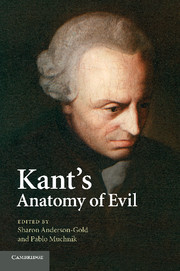Book contents
- Frontmatter
- Contents
- Contributors
- List of abbreviations
- Introduction
- 1 Kant's “Metaphysics of Permanent Rupture”: Radical Evil and the Unity of Reason
- 2 Kantian Moral Pessimism
- 3 Kant, the Bible, and the Recovery from Radical Evil
- 4 Kant's Moral Excluded Middle
- 5 Evil Everywhere: The Ordinariness of Kantian Radical Evil
- 6 An Alternative Proof of the Universal Propensity to Evil
- 7 Kant and the Intelligibility of Evil
- 8 Social Dimensions of Kant's Conception of Radical Evil
- 9 Kant, Radical Evil, and Crimes against Humanity
- 10 Unforgivable Sins? Revolution and Reconciliation in Kant
- Select bibliography
- Index
1 - Kant's “Metaphysics of Permanent Rupture”: Radical Evil and the Unity of Reason
Published online by Cambridge University Press: 04 May 2010
- Frontmatter
- Contents
- Contributors
- List of abbreviations
- Introduction
- 1 Kant's “Metaphysics of Permanent Rupture”: Radical Evil and the Unity of Reason
- 2 Kantian Moral Pessimism
- 3 Kant, the Bible, and the Recovery from Radical Evil
- 4 Kant's Moral Excluded Middle
- 5 Evil Everywhere: The Ordinariness of Kantian Radical Evil
- 6 An Alternative Proof of the Universal Propensity to Evil
- 7 Kant and the Intelligibility of Evil
- 8 Social Dimensions of Kant's Conception of Radical Evil
- 9 Kant, Radical Evil, and Crimes against Humanity
- 10 Unforgivable Sins? Revolution and Reconciliation in Kant
- Select bibliography
- Index
Summary
Introduction
In Evil in Modern Thought: An Alternative History of Philosophy, Susan Neiman traces the history of modern philosophy – and of Kant's pivotal role in that history – along a trajectory shaped by the problem of evil rather than by the problems of knowledge, certainty, and doubt that have been the staple of standard readings of that history. She characterizes Kant's account of our human circumstances as a “metaphysic of permanent rupture” in which
[t]he gap between nature and freedom, is and ought, conditions all human existence … Integrity requires affirming the dissonance and conflict at the heart of experience. It means recognizing that we are never, metaphysically, at home in the world. This affirmation requires us to live with the mixture of longing and outrage that few will want to bear.
In this essay I plan to show how the duality that Neiman marks out as “the dissonance and conflict at the heart of experience” functions to outline the contours of a philosophical anthropology that is embedded in Kant's critical project. The spatio-temporally embodied freedom of finite human reason stands at the conceptual center of this anthropology and serves as locus for Kant's account of evil. That account exhibits evil as marking a fissure that lies athwart human efforts to render fully intelligible the world that presents itself to us, in our embodied freedom, both as nature – an object for reason's theoretical inquiry – and as freedom – a field for human action shaped by reason's moral exercise.
- Type
- Chapter
- Information
- Kant's Anatomy of Evil , pp. 13 - 32Publisher: Cambridge University PressPrint publication year: 2009



